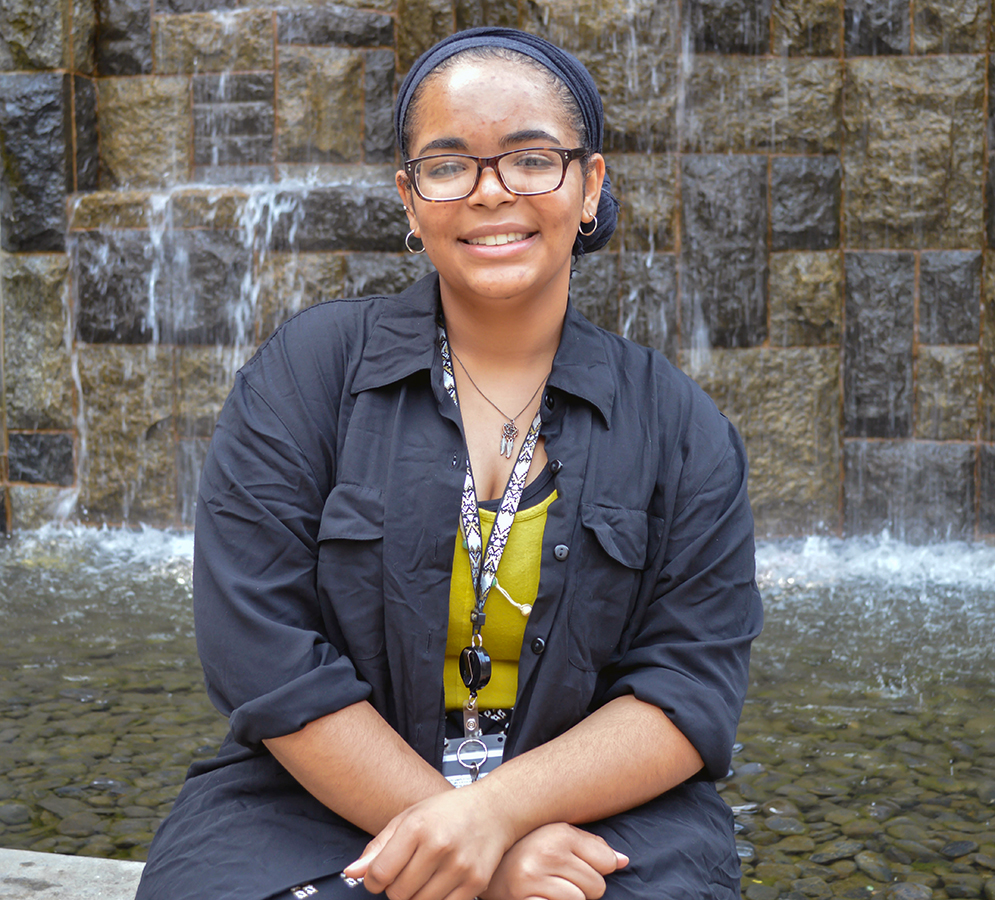Student Leaders for Animal Ethics now on campus
Club President Rodriguez-Truley hopes to educate students
Photo by Megan Bixler
Sienna Rodriguez-Truley, SLAE President, welcomes curious students who are interested in animal rights.
September 19, 2017
While many people eat meat, most do not think about where it comes from. A group of concerned students have a plan to work against that.
“I want people who are curious about animal welfare and the plant-based lifestyle to come with questions,” said Sienna Rodriguez-Truley, a freshman creative writing major. “I want them to feel welcome here and be a part of the family.”
Rodriguez-Truley is organizing a club on campus called the Student Leaders for Animal Ethics (SLAE) which she hopes will inform students on and off campus about how animal welfare intersects with their diets. Though not yet a formally recognized club, Rodriguez-Truley is in the process of submitting it for USG submission.
SLAE is not exclusive to only vegetarians and vegans, but instead, anyone who might be interested in learning about these lifestyles. It is loosely based on the Humane League where Rodriguez-Truley is an intern.
The club plans to teach about topics such as factory farming and how to put pressure on companies that utilize this process to distribute their products. SLAE will also offer tips for those who wish to become a vegan or vegetarian, as well as resources to find cheaper vegetarian and vegan based options and recipes.
Boycotting companies that use inhumane farming techniques is another step Rodriguez-Truley feels anyone can make to allow pressure to build and ultimately force companies to change how they operate.
“Chickens, for example, are stuffed in cages barely bigger than their bodies, fattened to the point where their legs cannot support their own weight, and obtain cardiac and respiratory issues which shortens their life spans,” Rodriguez-Truley said.
Rodriguez-Truley serves as president of SLAE and is making sure it becomes a more empowering, educational club that will help people make more conscious decisions concerning where they get their food. The other offices of the club are vice-president and sophomore education major Alyssa Lowe and Joy Jacobs, the club’s treasurer and a freshman accounting major.
Lowe stopped eating meat “cold-turkey” to become vegetarian, and has been for about four years now. Jacobs, on the other hand, is not vegetarian or vegan, but that is not keeping her from learning more as she assists the club.
“I am definitely curious about it,” Jacobs said. “I grew up with meat my whole life, so it will be difficult, but I want to see how it goes.”
Along with the education aspect of the club, Jacobs also hopes to eventually make Point Park an even more vegetarian and vegan-friendly campus by providing more options than what is currently offered.
While the campus has recently made the choice to offer vegetarian and some vegan options, it is still very minimal compared to non-vegetarian and vegan foods offered here on campus. Jacobs also hopes to inform the food services of possible new suppliers, both cage-free options and vegan and vegetarian brands of food.
“It is certainly hard to be vegan on campus, since less than half of the options are actually vegan,” Lowe stated in Rodriguez-Truley’s defense.
One of the interested members of the club is Emily McNatt, a freshman forensic science major. Though not currently a vegetarian, McNatt has previously made the attempt to switch.
Rodriguez-Truley wants to encourage members to use their voices to challenge the social norms that surrounds vegetarianism and veganism. She hopes that education will guide members on whatever path they choose.
“The ultimate reason I chose to go vegan was for the animals” Rodriguez-Truly said.
Even Rodriguez-Truley knew her transition would take a lot of time and dedication. She has been a vegan for almost three and a half years now, but has been meat-free for about six years.
“It was tough, at first, because I come from a very traditional Puerto Rican family where meat is considered a luxury,” she said.
Though her family did not seem accepting of her switch at first, she was certain to edify them on the real reasons why she made the choice. This has only motivated her more to continue educating anyone who is curious.
Rodriguez-Truley stressed that there are many small steps you can take whether planning to make the transition or simply being aware of the products that use inhumane techniques.
“The club’s focus is progress, not perfection,” said Rodriguez-Truley.
Rodriguez-Truley, Lowe and Jacobs all wish to see this club continue for the years to come after they graduate. Even though that is a few years down the road, they have plenty of activities and events they are planning to host for new members and anyone who might be interested in attending.
“Even if you don’t transition, I hope you become educated from the club and can have the knowledge to make your own formed decision,” Lowe said.
Rodriguez-Truley has a message to non-vegetarians on campus: “Be curious.”

















